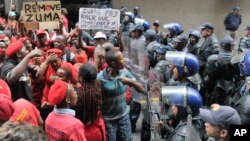In the space of four short hours last week, South Africans witnessed their stable 20-year-old democracy unravel amid scenes of chaos and violence in Parliament.
Since then, many political observers and analysts are lamenting a system broken by the very political leaders elected to preserve it.
“You now live in a brand new country,” wrote journalist Richard Poplak, “one that’s ensconced in a deep and very serious political crisis.”
The occasion was President Jacob Zuma’s annual State of the Nation Address on February 12 - a long, clunky speech that included such rhetoric as “we have developed a plan which involves both short, medium-term and long-term responses” - accented by Zuma’s customarily stilted, oddly cadenced delivery.
State of a nation, president
Zuma’s speech was never going to be easy.
He has become increasingly unpopular over a long-running corruption scandal in which he is accused of spending about $23 million in government funds to upgrade his personal home.
The speech also was held against the backdrop of almost daily nationwide power cuts, accusations of government corruption and incompetence, and anger over growing poverty and inequality.
It wasn’t the speech itself that grabbed attention, but the run-up. It started with widespread outrage over phone-jamming inside Parliament; progressed to a shouting match led by radical MPs that in turn led to a scuffle with armed security; which then prompted an angry outburst and a mass walkout by the official opposition party.
And then, as commentators tell it, both sides dug in their heels.
Bitter aftermath
Over the weekend, National Assembly Speaker Baleka Mbete took to name-calling - skewering the leader of the far-left Economic Freedom Fighters party, Julius Malema.
"If we don't work, we will continue to have cockroaches like Malema roaming all over the place," she said. Cockroaches, many commentators were quick to note, were what pro-genocide Rwandans called their victims.
On Tuesday, the opposition had its chance to speak in a parliamentary debate on the State of the Nation address. And speak it did, in a barrage of pointed invective aimed squarely at the president.
“Honorable president, in these very chambers, just five days ago, you broke Parliament,” intoned Democratic Alliance Parliamentary Leader Mmusi Maimane, who last week led his party’s walkout from the speech after Mbete called in armed guards to remove EFF members who challenged the president by asking him about the scandal.
“Please understand, Honorable president, when I use the term ‘honorable,’ I do it out of respect for the traditions and conventions of this august house,” said Maimane, while looking squarely at a smiling Zuma. “But please do not take it literally.
"For you, Honorable president, are not an honorable man. You are a broken man, presiding over a broken society. You are willing to break every democratic institution to try and fix the legal predicament you find yourself in. You are willing to break this Parliament if it means escaping accountability for the wrongs you have done," Maimane said.
Malema, the firebrand leader who challenged Zuma before being expelled from the ANC and then forming his own party, has for months focused squarely on the scandal surrounding the president and his leadership, or lack thereof.
In his comments on the State of the Nation address, Malema took issue with Zuma’s six years at the helm, blaming him for sugar-coating the reality for most South Africans.
“When you are telling a so-called good story here, the children on Zenzele informal settlement do not have water,” Malema said. “When you are telling a so-called good story here, the children of Sxwetla sleep side by side with rats. When you are telling a so-called good story here, mineworkers continue to suffer indignity in the belly of the earth.
"We have to save these people by removing you from political office and take political power on behalf of the people," he added.
Turning point?
Political analyst Ebrahim Fakir of the Electoral Institute for Sustainable Democracy in Southern Africa told VOA that he doesn’t think this speech was a particular turning point in South African history.
Fakir noted despite the fracas, the speech still went on, and order was restored in line with the rules of the house.
“I think it was an important momen. I don’t think it was a turning point because if you say turning point, turning point to what?" he asked
"Turning point to better, or turning point to worse? Obviously there are some people who will say this is a turning point to the worse. I’m afraid that’s not so, because it does appear that the rules, the institutional edifice … still reign supreme," Fakir said.
Zuma still retains the support of his party, at least superficially, though commentators noted the lackluster tone of ANC defenses in the face of opposition criticism Tuesday.
“The people of the country have full confidence in you,” said Free State Premier Ace Magashule. “Just stay focused.”
Takes comments in stride
Zuma, as ever, took all this in stride.
On the night of his speech, after the fracas had died down, the president rose from his seat - and chuckled - and continued as if nothing had happened.
And that is what drew incredulity in the parliamentary debate.
“You laughed,” Maimane said. “You laughed while the people of South Africa cried for their beloved country. … Honorable president, we will never forgive you for what you have done.”
Zuma’s response to that? He sat in Parliament and laughed.




